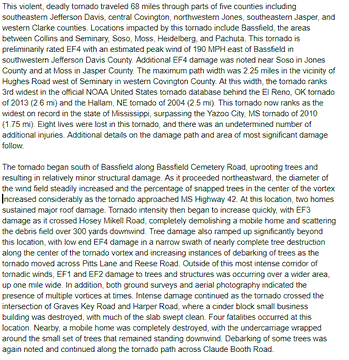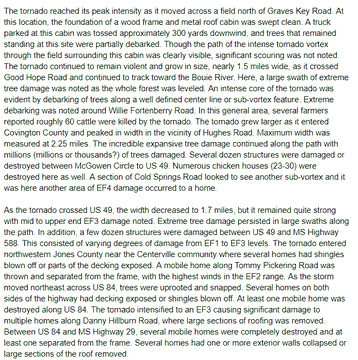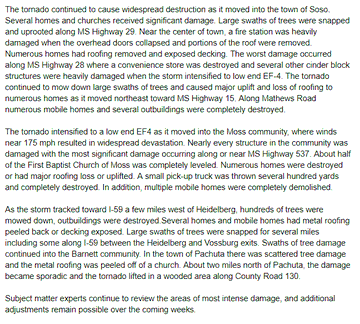Updated Apr. 20, 2020 10:32 AM
An EF4 twister, 2.25 miles in width hit Moss, Mississippi, on April 12, the National Weather Service confirmed, making it the widest tornado ever observed in the state.
The tornado, which was one of more than 100 tornadoes that ripped through the South during Easter weekend, is responsible for 8 deaths in Moss, Mississippi.
It left behind a path of immense destruction, and one family was left with nothing except for their lives and their safe room.

Amber Phillips stands outside the family's safe room, located on their property in Moss, Miss., following a tornado, Monday, April 13, 2020. While the rest of their home was obliterated in a matter of seconds Sunday afternoon, Andrew Phillips, his wife Amber and their kids, ages 2 and 6 months, survived the storm without a scratch inside the small safe room, which doubles as a closet. (Andrew Phillips via AP)
The widest tornado in the history touched down in El Reno, Oklahoma, on May 31, 2013, and reached a width of 2.6 miles.
"As far as I know, there have only ever been a handful of tornadoes more than 2 miles wide," AccuWeather Meteorologist Jake Sojda said.
As for the Moss, Mississippi, tornado, all of the ingredients needed for a massive tornado were present.
"One of the factors that could have led to such a long-lived, large and powerful tornado was that when it occurred, there weren't any other storms around to interrupt the inflow into the storm," Sojda said.
"In supercells such as this one, tornadoes occur at the intersection between warm, moist air flowing into the front side of the storm, the inflow and rain-cooled air descending out of the backside of the storm, which is the outflow," Sojda said.
According to Sojda, the outflow effectively helps to "funnel " the warm, moist air into the rising air at the center of the storm.
RELATED:
"When the inflow is particularly strong, uninterrupted by any other storms in the area, and high in moisture content, like often occurs near the Gulf of Mexico, you can form extremely large tornadoes," Sojda said.
Keep checking back on AccuWeather.com and stay tuned to the AccuWeather Network on DirecTV, Frontier and Verizon Fios.





No comments:
Post a Comment